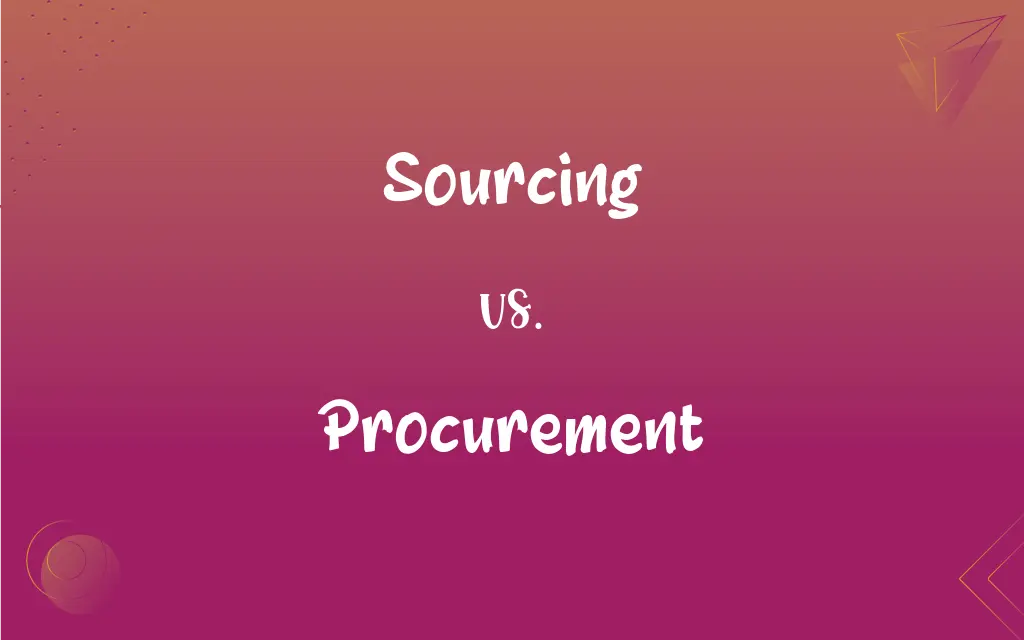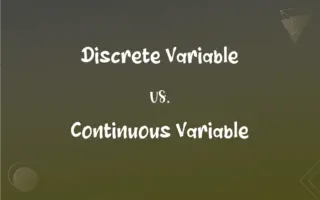Sourcing vs. Procurement: What's the Difference?
Edited by Aimie Carlson || By Harlon Moss || Published on November 13, 2023
Sourcing is finding and vetting suppliers; procurement involves acquiring goods or services.

Key Differences
Sourcing and procurement are critical elements in the supply chain management process, but they serve distinct functions and have different focuses. Sourcing is the process of identifying and selecting suppliers that can provide the goods or services a company needs, emphasizing the strategic selection of suppliers based on various criteria such as quality, cost, and reliability. In contrast, procurement is the broader process that includes not just sourcing, but also the ordering, purchasing, and arranging for the delivery of goods and services. While sourcing is primarily concerned with finding the right suppliers, procurement encompasses the entire process of acquiring the necessary resources.
Sourcing plays a pivotal role in determining the cost, quality, and overall value of the products and services obtained, as it involves thorough market research and supplier evaluation. Procurement, however, is more transactional and operational, dealing with the actual purchase and logistics of obtaining the resources once the sourcing decisions have been made. Sourcing strategies are developed with long-term relationships and supply chain stability in mind, whereas procurement actions are focused on fulfilling immediate business requirements and ensuring that the operations run smoothly.
While sourcing is primarily strategic, concentrating on building partnerships and negotiating contracts with suppliers, procurement is tactical and focuses on the execution of purchasing decisions. Sourcing requires deep market knowledge and analysis to identify potential suppliers that can meet the company’s needs, whereas procurement involves activities such as placing orders, managing purchase orders, and handling the financial aspects of buying. Therefore, sourcing sets the stage for procurement by identifying and selecting the best suppliers, and procurement follows through by handling the actual acquisition of goods and services.
In terms of the timeline, sourcing often precedes procurement in the supply chain process. Sourcing involves the careful evaluation and selection of suppliers, which can be a time-consuming process requiring negotiation and relationship-building. Procurement, on the other hand, comes into play after suppliers have been sourced, dealing with the practical aspects of purchasing and ensuring timely delivery of goods and services. Sourcing establishes the framework within which procurement operates, setting the standards and terms under which procurement activities are conducted.
In conclusion, sourcing and procurement are interconnected yet distinct aspects of supply chain management. Sourcing is about strategically selecting suppliers and forming partnerships that align with a company's goals, focusing on the long-term aspects of supplier relationships. Procurement, in contrast, is about efficiently and effectively executing the purchase and acquisition of goods and services based on the groundwork laid by sourcing. Both are essential for ensuring a reliable and cost-effective supply chain, and their coordinated effort is vital for the overall success of any organization.
ADVERTISEMENT
Comparison Chart
Primary Focus
Finding and selecting suppliers.
Acquiring goods or services.
Scope
Strategic, long-term supplier relations.
Tactical, transaction-oriented activities.
Activities Involved
Supplier evaluation, negotiation, market analysis.
Ordering, contract management, payment processing.
Goal
Optimize supplier base for quality and cost.
Ensure timely, cost-effective acquisition of goods.
Stage in Supply Chain
Preliminary, focuses on potential suppliers.
Subsequent, focuses on actual procurement process.
ADVERTISEMENT
Sourcing and Procurement Definitions
Sourcing
Strategic supplier evaluation.
Their sourcing strategy reduced costs significantly.
Procurement
Act of purchasing from suppliers.
Efficient procurement saved the company money.
Sourcing
Process of selecting suppliers.
Effective sourcing led to better supply chain stability.
Procurement
Management of buying activities.
Their procurement process is highly streamlined.
Sourcing
Finding sources for goods or services.
The project required sourcing specialized equipment.
Procurement
Securing necessary resources.
Procurement played a vital role in the project's success.
Sourcing
Identifying potential suppliers.
The company is currently sourcing new vendors for its product.
Procurement
Process of acquiring goods or services.
The procurement of new computers was completed last week.
Sourcing
Establishing supply chain partnerships.
Sourcing reliable partners was key to their success.
Procurement
Transactional purchasing operations.
The procurement department handled all orders efficiently.
Sourcing
A person or thing from which something comes into being or is derived or obtained
Alternative sources of energy.
The source of funding for the project.
Procurement
To get by special effort; obtain or acquire
Managed to procure a pass.
Procurement
To bring about; effect
Procure a solution to a knotty problem.
FAQs
Is sourcing a strategic process?
Yes, sourcing is highly strategic and involves long-term planning.
What's the main goal of sourcing?
To find and establish relationships with the best suppliers.
Can procurement affect a company's profitability?
Definitely, efficient procurement can directly impact profitability.
How does procurement differ from purchasing?
Procurement is broader, encompassing purchasing and additional activities.
Can sourcing impact cost savings?
Absolutely, effective sourcing can lead to significant cost reductions.
Is supplier negotiation part of sourcing?
Yes, negotiation is an essential aspect of sourcing.
Does procurement involve contract management?
Yes, it includes managing contracts and supplier relations.
Is sustainability considered in sourcing?
Increasingly, sustainability is a critical factor in sourcing decisions.
Does procurement handle inventory management?
It often overlaps with inventory management, especially in ordering.
Can technology enhance procurement processes?
Yes, technology can greatly streamline and improve procurement.
Can procurement strategies vary by industry?
Absolutely, procurement strategies are often industry-specific.
Is e-procurement becoming more common?
Yes, electronic procurement systems are increasingly popular.
Is procurement only about buying goods?
No, it also involves services and other necessary resources.
Does sourcing require market research?
Yes, market analysis is a key part of the sourcing process.
Are procurement activities time-sensitive?
Often, procurement is time-bound to meet operational needs.
How does sourcing affect supply chain risk?
Good sourcing can mitigate risks by ensuring reliable suppliers.
Should sourcing focus on cost alone?
No, it should balance cost, quality, and supplier reliability.
Does procurement interact with multiple departments?
Yes, procurement typically involves cross-departmental collaboration.
Is building supplier relationships part of sourcing?
Building and maintaining supplier relationships is key to sourcing.
Does sourcing require understanding global markets?
Global market knowledge can be essential, especially in international sourcing.
About Author
Written by
Harlon MossHarlon is a seasoned quality moderator and accomplished content writer for Difference Wiki. An alumnus of the prestigious University of California, he earned his degree in Computer Science. Leveraging his academic background, Harlon brings a meticulous and informed perspective to his work, ensuring content accuracy and excellence.
Edited by
Aimie CarlsonAimie Carlson, holding a master's degree in English literature, is a fervent English language enthusiast. She lends her writing talents to Difference Wiki, a prominent website that specializes in comparisons, offering readers insightful analyses that both captivate and inform.








































































